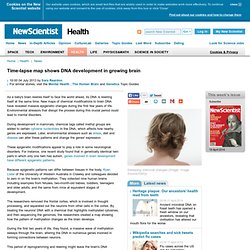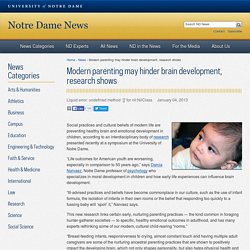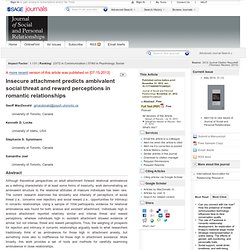

Time-lapse map shows DNA development in growing brain - health - 04 July 2013. As a baby's brain rewires itself to face the world ahead, its DNA is rewiring itself at the same time.

New maps of chemical modifications to brain DNA have revealed massive epigenetic changes during the first few years of life. Environmental stressors that disrupt the process during this crucial period could lead to mental disorders. During development in mammals, chemical tags called methyl groups are added to certain cytosine nucleotides in the DNA, which affects how nearby genes are expressed. Later, environmental stressors such as stress, diet and disease can alter these patterns and change the genes' expression. These epigenetic modifications appear to play a role in some neurological disorders. Because epigenetic patterns can differ between tissues in the body, Ryan Lister of the University of Western Australia in Crawley and colleagues decided to zero in on the brain's methylation.
Journal reference: Science, DOI: 10.1126/science.1237905 More From New Scientist. 5 Hallmarks of Bad Parenting That Are Actually Good for Kids. Anyone who grew up in the '80s knows that parenting used to be a whole other ball of wax.

Allergies were rare, kids roamed the suburbs in roving bicycle gangs and unsupervised adventures were around every corner. Kids who grew up in the '90s couldn't leave the house without a speech on stranger danger and an extra dose of Flintstones vitamins, just in case. But it turns out there are some things that lazy/negligent parents kind of got right. Like ... #5. "Because I said so! " Every parent winds up saying this, whether they like it or not. No, in these situations it's best to quickly put your foot down and make it clear who's the boss. Getty"You lost, kid. The Surprising Benefit: Actually, science says that those fights provide excellent opportunities for your children to practice their reasoning, discussion and negotiation skills. GettyAlthough raising a wuss means you can force them to wear stupid costumes and dance for you. #4.
Getty Everyone knows how damaging refined sugar is to kids. 5 Amazing Things You Didn't Know Babies Could Do. Infants tend to be lazy, stupid turds, as anyone who has had to work with one can attest.

Even if you find babies adorable, you have to admit that the only "amazing" thing about them is how they can turn milk into poop that looks and smells like it came out of a trucker who only eats at buffets. 5 Superpowers We All Had as Babies (According to Science) To many of us, kids are just a squishy bundle of preciousness that can't even take a decent punch.

If there's anything super about them it's their ability to produce a seemingly infinite amount of poop. But you only think this because, like most super geniuses, babies revel in deception because they answer to no god. Not unlike Clark Kent, babies everywhere managed to fool the world with their mild-mannered public persona, masking the amazing superpowers nearly all of them possess. Slap a pair of tights on any random toddler, and you have a bona fide superhero (or, realistically, supervillain). The many kick-ass powers we lost as we got older include: When deprived of one sense or a skill, a person usually compensates for it in some other way. You blame me for never making it as a professional dancer, mommy. It gets weirder. See, their mind-reading doesn't end with fellow humans. The Science of Attachment: Biological Roots of Love.
Modern parenting may hinder brain development, research shows. Social practices and cultural beliefs of modern life are preventing healthy brain and emotional development in children, according to an interdisciplinary body of research presented recently at a symposium at the University of Notre Dame.

“Life outcomes for American youth are worsening, especially in comparison to 50 years ago,” says Darcia Narvaez, Notre Dame professor of psychology who specializes in moral development in children and how early life experiences can influence brain development. “Ill-advised practices and beliefs have become commonplace in our culture, such as the use of infant formula, the isolation of infants in their own rooms or the belief that responding too quickly to a fussing baby will ‘spoil’ it,” Narvaez says.
The United States has been on a downward trajectory on all of these care characteristics, according to Narvaez. Insecure attachment predicts ambivalent social threat and reward perceptions in romantic relationships. Although theoretical perspectives on adult attachment forward relational ambivalence as a defining characteristic of at least some forms of insecurity, work demonstrating an ambivalent structure to the relational attitudes of insecure individuals has been rare.

The current research examines the similarity and intensity of perceptions of social threat (i.e., concerns over rejection) and social reward (i.e., opportunities for intimacy) in romantic relationships. Using a sample of 1004 participants, evidence for relational ambivalence was found for both anxious and avoidant attachment. Individuals high in anxious attachment reported relatively similar and intense threat and reward perceptions, whereas individuals high in avoidant attachment showed evidence of similar, but not intense, threat and reward perceptions. . © 2012 SAGE Publications. Los Angeles, London, New Delhi, Singapore and Washington DC.